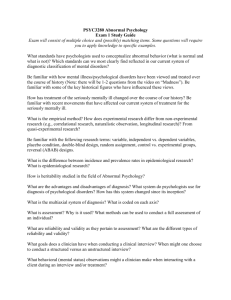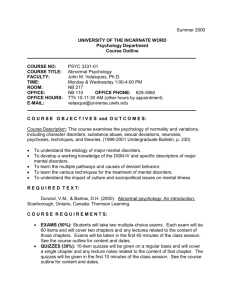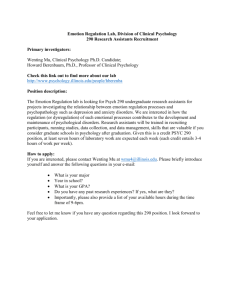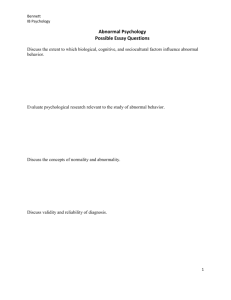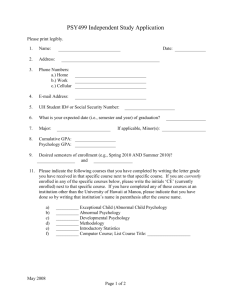Abnormal Psychology
advertisement
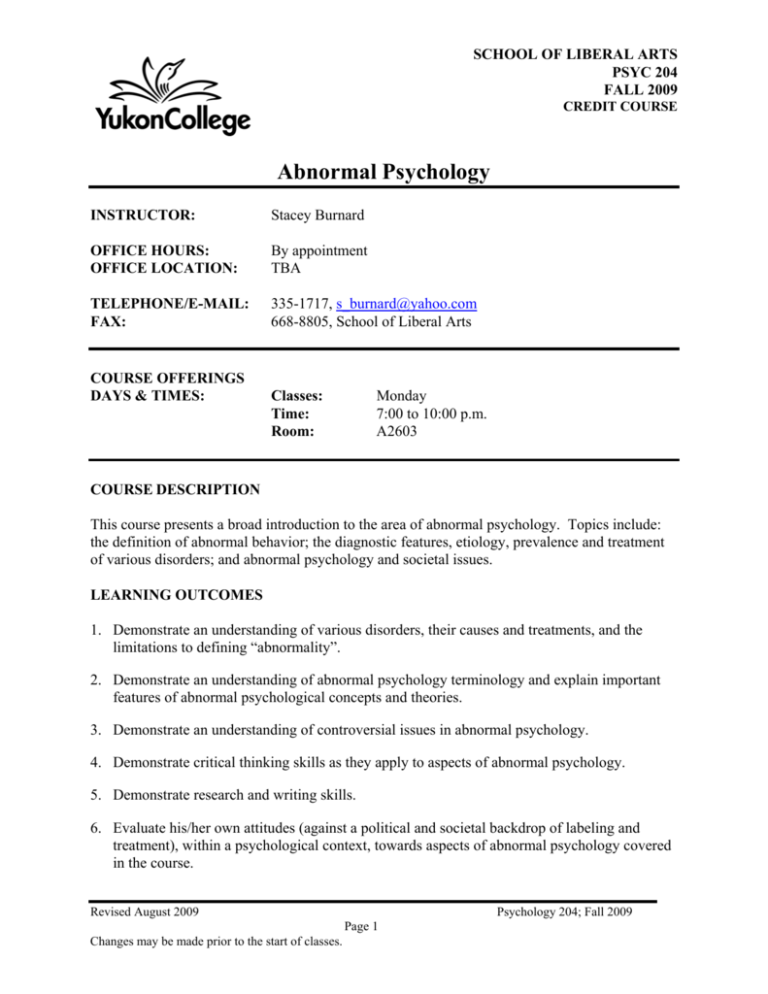
SCHOOL OF LIBERAL ARTS PSYC 204 FALL 2009 CREDIT COURSE Abnormal Psychology INSTRUCTOR: Stacey Burnard OFFICE HOURS: OFFICE LOCATION: By appointment TBA TELEPHONE/E-MAIL: FAX: 335-1717, s_burnard@yahoo.com 668-8805, School of Liberal Arts COURSE OFFERINGS DAYS & TIMES: Classes: Time: Room: Monday 7:00 to 10:00 p.m. A2603 COURSE DESCRIPTION This course presents a broad introduction to the area of abnormal psychology. Topics include: the definition of abnormal behavior; the diagnostic features, etiology, prevalence and treatment of various disorders; and abnormal psychology and societal issues. LEARNING OUTCOMES 1. Demonstrate an understanding of various disorders, their causes and treatments, and the limitations to defining “abnormality”. 2. Demonstrate an understanding of abnormal psychology terminology and explain important features of abnormal psychological concepts and theories. 3. Demonstrate an understanding of controversial issues in abnormal psychology. 4. Demonstrate critical thinking skills as they apply to aspects of abnormal psychology. 5. Demonstrate research and writing skills. 6. Evaluate his/her own attitudes (against a political and societal backdrop of labeling and treatment), within a psychological context, towards aspects of abnormal psychology covered in the course. Revised August 2009 Psychology 204; Fall 2009 Page 1 Changes may be made prior to the start of classes. DELIVERY METHODS/FORMAT (3-0-0) The class format will consist of lectures and class discussions. EQUIVALENCY/TRANSFERABILITY UBC Psyc 2nd yr. (3) UVIC Psyc 200L (1.5) UAS Psyc S340 (3) UNBC Psyc 303 (3) SFU Psyc 241 (3) UAF Psyc Elec. (3) UR Pysc 333 (3) For more information about transferability contact the School of Liberal Arts. COURSE PREREQUISITES Psychology 100 and Psychology 101. COURSE REQUIREMENTS/EVALUATION: ATTENDANCE AND PARTICIPATION Attendance will be taken at every class. Your participation is essential to the development of class unity and the learning process for everyone including yourself. Group discussion offers you a forum in which to articulate your own ideas and to be educated through the ideas of others. We will create together a respectful environment where everyone will feel safe and welcome to speak. A student may be withdrawn from a course if more than 10% of the scheduled contact hours are missed in any one course. Withdrawal from a course may result in loss of full-time status and loss of sponsorship funding. Examinations include lecture material therefore attendance is encouraged. TESTS & ASSIGNMENTS CRITICAL THINKING EXERCISE: 10% Students will be given one critical thinking exercise at the beginning of the course to help refine critical thinking skills. RESEARCH AND POSITION PAPER: 35% There will be one research and position paper assignment that will allow students to research a controversial topic in child psychology that is meaningful to them. Marks will be allotted for form as well as content. Marks will be given for communication skills including grammar, sentence and paragraph structure, spelling and organization. Proper referencing (APA) is required. Suggested topics will be provided to students during the first week of classes. Students may choose their own topic provided they get approval from course instructor beforehand. Late papers : 5% lost for each day late Revised August 2009 Psychology 204; Fall 2009 Page 2 Changes may be made prior to the start of classes. Plagiarism Plagiarism is a serious academic offence. Students who plagiarize material for assignments will receive a mark of zero (F) on the assignment and may fail the course. Plagiarism may also result in dismissal from a program of study or the college. Plagiarism involves presenting the words of someone else as your own. Plagiarism can be the deliberate use of a whole piece of another person’s writing, but more frequently it occurs when students fail to acknowledge and to document sources from which they have taken material. Whenever the words, research, or ideas of others are directly quoted or paraphrased, they must be documented according to standard procedures (APA or MLA). As well, re-submitting a paper for which you have previously received credit is also an academic offence. EXAMINATIONS There are two exams in this course, a mid-term (20%) and a final exam (35%). Examinations will cover lecture material and assigned readings. The questions may include multiple choice, short answers, and essay- type questions. The final exam is scheduled during exam week. It should be noted that alternate arrangements to write an exam would only be considered under exceptional circumstances (i.e., bereavement, illness). If there is a circumstance you know about before the exam date, please consult me in advance and we will discuss what arrangements are possible. EVALUATION Critical Thinking – 10% Position Paper – 30% Mid-term – 30% Final Exam – 30% REQUIRED TEXTBOOKS/MATERIALS: Required text: Comer, R.J. (2010). Abnormal psychology, (7th ed.). Worth Publishers, New York. OPTIONAL TEXTS American Psychiatric Association. (2000). Diagnostic and statistical manual of mental disorders (4th ed.). Washington, DC: Author. American Psychological Association (2001). Publication Manual (5th ed.). Washington, DC: Author. Revised August 2009 Psychology 204; Fall 2009 Page 3 Changes may be made prior to the start of classes. ABNORMAL PSYCHOLOGY PSYCHOLOGY 204 Week of Topic Readings Sept. 8 What is Abnormal Psychology/Abnormal Behaviour? Research Methods Chapter 1&2 Sept. 15 Theoretical Perspectives Critical thinking Assignment Due Chapters 3 Sept. 22 Classification & Assessment Chapter 4 Sept 29 Stress and Anxiety disorders Chapter 5 & 6 Oct. 6 Somatoform and Dissociative Disorders and Mood Disorders Chapter 7, 8 & 9 Oct. 13 Thanksgiving Oct. 20 Schizophrenia & Psychosis Oct. 27 MID-TERM Nov. 3 Personality Disorders Nov. 10 Disorders of Childhood & Eating Disorders Annotated Bibliography & Research Paper Due Chapter 17 & 11 Nov. 17 Substance Abuse & Dependence & Addictions Chapter 12 Nov. 24 Sexual Disorders and Paraphilia Dec. 1 Other Related Disorders and Exam Review Dec. 7 Final Examination to be scheduled Revised August 2009 Chapter 16 Chapter 13 Psychology 204; Fall 2009 Page 4 Changes may be made prior to the start of classes. Chapter 14 &15
